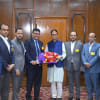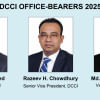Developing effective ESG compliance strategy a must now: DCCI

Developing effective environmental, social and corporate governance (ESG) compliance strategies in alignment with the global value chain is a must now, Dhaka Chamber of Commerce & Industry (DCCI) President Ashraf Ahmed said today.
It is also important to taking into account the importance of ESG compliance and integrating ESG considerations into the decision-making processes and organisation culture, he said.
He also underscored the need for educating the stakeholders, including employees, management, investors, regulators and the mass public, about the importance of ESG compliance and its reporting.
He made the comments at a discussion titled "Navigating the challenges and opportunities of ESG compliance in Bangladesh", organised by the Dhaka Chamber at its office in the capital.
As Bangladesh is being more connected to the world and the country's international trade is also increasing by the day, ESG compliance is becoming mandatory for businesses, Ahmed said.
Investors consider ESG factors when assessing a business's potential since it is a sign of resilience and long-term financial health, he said.
"It is worth mentioning that the trend of ESG reporting is going upward in Bangladesh. Organisations in different industries have started reporting on their ESG performance, and the government bodies have also taken initiatives to promote and encourage ESG reporting."
Compliance is mandatory in every sector and compliance always increases the credibility of business, said Md Munim Hassan, director general of the Department of Patent, Design and Trademarks under the industries ministry.
"For environmental or social compliance, we individually should take responsibility on our shoulder. We should not look into what others do."
During 2016 to 2022, some 17 products of Bangladesh got geographical indication (GI) whereas since 2023 to till date already 14 products have got the certification and 30 more are waiting to receive it, he said.
Md Anwarul Alam, director general (additional secretary) of Bangladesh Accreditation Board (BAB), said the accreditation board is directly linked with ESG.
The BAB works for ensuring quality of goods and services and its certification is accepted worldwide, he said.
He also urged all to be compliant and suggested the lab owners to get accredited from BAB.
The ESG is also interlinked with the vision of Smart Bangladesh, Alam said.
The event's keynote speaker, Zaku Uz Zaman, country representative of the United Nations Industrial Development Organisation Bangladesh, said the term ESG came into use in the early 2000s, but its foundations were laid in the 1990s.
M Niaz Asadullah, visiting professor of economics at the University of Reading in the UK; Mohammad Bin Quasem, director of Echotex Ltd: Yeasmin Akther, business manager for knowledge, health and nutrition at SGS Bangladesh Limited, and M Abu Horairah, former vice president of the DCCI, attended the event along with former DCCI directors Enamul Haque Patwary and Rashid Shah Shamrat.

 For all latest news, follow The Daily Star's Google News channel.
For all latest news, follow The Daily Star's Google News channel. 








Comments